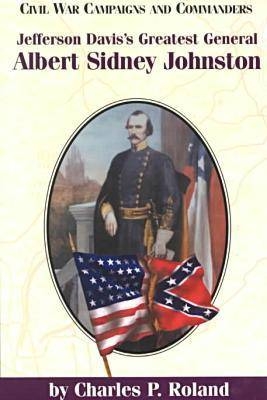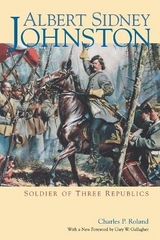
Albert Sidney Johnstone
Jefferson Davis's Greatest General
Seiten
2000
McWhiney Foundation Press (Verlag)
978-1-893114-20-3 (ISBN)
McWhiney Foundation Press (Verlag)
978-1-893114-20-3 (ISBN)
- Titel erscheint in neuer Auflage
- Artikel merken
Zu diesem Artikel existiert eine Nachauflage
The author of "Lee: A Historian's Assessment" turns the spotlight on Albert Sidney Johnston, considered the Confederacy's greatest general before he was cut down in battle at Shiloh in 1862. Photos & maps.
To Confederate president Jefferson Davis, America had no finer soldier than Kentucky-born Texan Albert Sidney Johnston. Following the outbreak of the Civil War, Davis turned to Johnston to take control of the deteriorating situation in the Western Theater. With a widely dispersed and undermanned army, Johnston tried but failed to hold the line in Kentucky and Tennessee.After yielding Forts Henry and Donelson, and Nashville, the Confederates fell back into Alabama and Mississippi, where Johnston rallied his troops for a surprise attack against Federal forces in western Tennessee. Thus far, Johnston's leadership had brought defeat and retreat, prompting critics to call for his removal, but Davis would have none of that. Finally, in April 1862, Johnston unleashed his Rebel army in what came to be known as the Battle of Shiloh--the first great battle of the war and one of the bloodiest. Surprise was complete and a stunning Confederate victory seemed likely. Johnston appeared to be everywhere, directing the fighting and inspiring his men. But at the height of the battle, he fell wounded and bled to death in a matter of minutes. The Confederate attack lost momentum and eventually was halted. The next day a reinforced Federal army drove the Southerners from the field. The battle that promised so much ended in a bitter defeat made worse by the loss of a man upon whom rested so much hope.
Questions about Johnston's generalship and the impact of his death have occupied students of the Civil War since 1862. While no one can know for sure if Johnston would have confirmed Davis's lofty opinion of him, at Shiloh, at least, he showed great promise. As Charles P. Roland writes, "Jefferson Davis had reason to consider Johnston his greatest general."
To Confederate president Jefferson Davis, America had no finer soldier than Kentucky-born Texan Albert Sidney Johnston. Following the outbreak of the Civil War, Davis turned to Johnston to take control of the deteriorating situation in the Western Theater. With a widely dispersed and undermanned army, Johnston tried but failed to hold the line in Kentucky and Tennessee.After yielding Forts Henry and Donelson, and Nashville, the Confederates fell back into Alabama and Mississippi, where Johnston rallied his troops for a surprise attack against Federal forces in western Tennessee. Thus far, Johnston's leadership had brought defeat and retreat, prompting critics to call for his removal, but Davis would have none of that. Finally, in April 1862, Johnston unleashed his Rebel army in what came to be known as the Battle of Shiloh--the first great battle of the war and one of the bloodiest. Surprise was complete and a stunning Confederate victory seemed likely. Johnston appeared to be everywhere, directing the fighting and inspiring his men. But at the height of the battle, he fell wounded and bled to death in a matter of minutes. The Confederate attack lost momentum and eventually was halted. The next day a reinforced Federal army drove the Southerners from the field. The battle that promised so much ended in a bitter defeat made worse by the loss of a man upon whom rested so much hope.
Questions about Johnston's generalship and the impact of his death have occupied students of the Civil War since 1862. While no one can know for sure if Johnston would have confirmed Davis's lofty opinion of him, at Shiloh, at least, he showed great promise. As Charles P. Roland writes, "Jefferson Davis had reason to consider Johnston his greatest general."
CHARLES P. ROLAND is Alumni Professor Emeritus at the University of Kentucky. His books include Reflections on Lee: A Historian's Assessment, An American Iliad: The Story of the Civil War, and Albert Sidney Johnston: Soldier of Three Republics.
| Erscheint lt. Verlag | 1.9.2000 |
|---|---|
| Zusatzinfo | photographs, maps |
| Verlagsort | Abilene, TX |
| Sprache | englisch |
| Themenwelt | Literatur ► Biografien / Erfahrungsberichte |
| Sachbuch/Ratgeber ► Geschichte / Politik | |
| Geschichte ► Allgemeine Geschichte ► Neuzeit (bis 1918) | |
| Geisteswissenschaften ► Geschichte ► Regional- / Ländergeschichte | |
| Sozialwissenschaften ► Politik / Verwaltung | |
| ISBN-10 | 1-893114-20-1 / 1893114201 |
| ISBN-13 | 978-1-893114-20-3 / 9781893114203 |
| Zustand | Neuware |
| Haben Sie eine Frage zum Produkt? |
Mehr entdecken
aus dem Bereich
aus dem Bereich
Europa 1848/49 und der Kampf für eine neue Welt
Buch | Hardcover (2023)
DVA (Verlag)
48,00 €
Giordano Bruno - ein ketzerisches Leben
Buch | Hardcover (2024)
C.H.Beck (Verlag)
29,90 €



